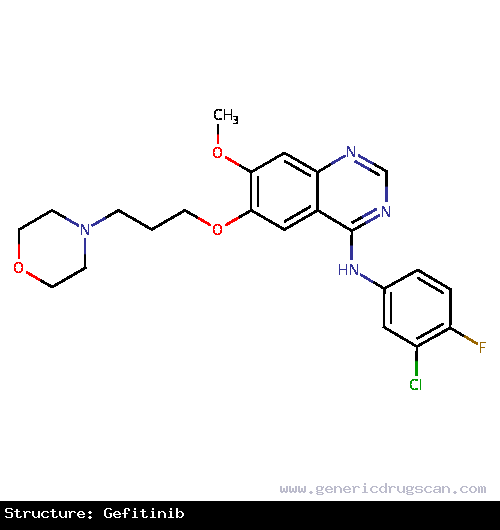Gefitinib Drug: Indication, Dosage, Precaution, Side Effect , Storage, Category Type and corresponding Brands - www.genericdrugscan.com
Gefitinib
Drug Status in USA : ApprovedDrug Status in Canada : Approved
pronunciation
pronounced as (ge fi' ti nib)
Why is this medication prescribed?
Gefitinib is used to treat non-small cell lung cancer that has spread to other parts of the body in people with certain types of tumors. Gefitinib is in a class of medications called kinase inhibitors. It works by blocking the action of a certain naturally occurring substance that may be needed to help cancer cells multiply.
How should this medicine be used?
Gefitinib comes as a tablet to take by mouth. It is usually taken with or without food once a day. Take gefitinib at around the same time every day. Follow the directions on your prescription label carefully, and ask your doctor or pharmacist to explain any part you do not understand. Take gefitinib exactly as directed. Do not take more or less of it or take it more often than prescribed by your doctor.
If you are unable to swallow the tablets, you may dissolve them in water. Place one tablet in 4 to 8 ounces (120 to 240 mL) of plain, noncarbonated drinking water. Stir with a spoon for about 15 minutes until the tablet is dissolved. Drink the mixture right away. Rinse the glass with another 4 to 8 ounces (120 to 240 mL) of water and drink the rinse water right away to be sure that you swallow all of the medication.
Your doctor may delay or permanently stop your treatment if you experience certain side effects. Be sure to tell your doctor how you are feeling during your treatment with gefitinib.
What are the precautions to be followed?
Before taking gefitinib,- tell your doctor and pharmacist if you are allergic to gefitinib, any other medications, or any of the ingredients in gefitinib tablets. Ask your pharmacist for a list of the ingredients.
- tell your doctor and pharmacist what prescription and nonprescription medications, vitamins, and nutritional supplements you are taking or plan to take. Be sure to mention any of the following: anticoagulants ('blood thinners') such as warfarin (Coumadin, Jantoven); antifungals such as itraconazole (Onmel, Sporanox) and ketoconazole (Nizoral); metoprolol (Lopressor, Toprol XL, in Dutoprol); phenytoin (Dilantin, Phenytek); and tricyclic antidepressants such as imipramine (Tofranil) and amitriptyline. Many other medications may interact with gefitinib, so be sure to tell your doctor about all the medications you are taking, even those that do not appear on this list. Your doctor may need to change the doses of your medications or monitor you carefully for side effects.
- if you are taking an antacid or an H2 blocker medication for indigestion, heartburn, or ulcers such as cimetidine (Tagamet), famotidine (Pepcid), nizatidine (Axid), or ranitidine (Zantac), take them at least 6 hours before or 6 hours after taking gefitinib.
- if you are taking a proton pump inhibitor medication for indigestion, heartburn, or ulcers such as esomeprazole (Nexium), lansoprazole (Prevacid), omeprazole (Prilosec), pantoprazole (Protonix), or rabeprazole (AcipHex), take it at least 12 hours before or at least 12 hours after taking gefitinib.
- tell your doctor if you have or have ever had pulmonary fibrosis (scarring of the lungs) or other lung or breathing problems, eye or vision problems, or liver disease.
- tell your doctor if you are pregnant or plan to become pregnant. Gefitinib may cause infertility (difficulty becoming pregnant) in females. However, you should use birth control to prevent pregnancy during your treatment with gefitinib and for at least 2 weeks after you stop taking the medication. If you become pregnant while taking gefitinib, call your doctor. Gefitinib may harm the fetus and increase the risk of pregnancy loss.
- tell your doctor if you are breastfeeding. You should not breast-feed while you are taking gefitinib.
What are possible side effects of this medication ?
Gefitinib may cause side effects. Tell your doctor if any of these symptoms are severe or do not go away:- dry skin
- itching
- rash
- acne
- mouth sores
- weakness
- new or worsening shortness of breath, cough, or fever
- severe or ongoing diarrhea
- severe abdominal pain
- loss of appetite
- eye pain, redness, or irritation
- vision changes
- watery eyes
- eye sensitivity to light
- hives
- blisters or peeling skin
- swelling of the eyes, face, lips, tongue, throat, hands, arms, feet, ankles or lower legs
- nausea
- vomiting
- yellowing of the skin or eyes
- dark urine
- pale stools
- pain or discomfort in the right upper stomach area
Gefitinib may cause other side effects. Call your doctor if you have any unusual problems while taking this medication.
How to store the medication and dispose it of after its use later?
Keep this medication in the container it came in, tightly closed, and out of reach of children. Store it at room temperature and away from excess heat and moisture (not in the bathroom).
Unneeded medications should be disposed of in special ways to ensure that pets, children, and other people cannot consume them. However, you should not flush this medication down the toilet. Instead, the best way to dispose of your medication is through a medicine take-back program.
Drug Category/Class
- Protein Kinase Inhibitors
- Antineoplastic and Immunomodulating Agents
- Antineoplastic Agents
- Cytochrome P-450 CYP2C9 Inhibitors
- Cytochrome P-450 CYP2C9 Inducers
- Cytochrome P-450 CYP2C19 Inducers
- CYP2D6 Inducers
- CYP2D6 Inducers (strong)
- CYP3A4 Inhibitors
- Protein kinase inhibitors
| Prescribed | For the continued treatment of patients with locally advanced or metastatic non-small cell lung cancer after failure of either platinum-based or do... |
| Weight : | 446.902 |
| Structure | Gefitinib |
 | |
| Formula | C22H24ClFN4O3 |
Gefitinib has 14 Brands listed
Search Generic Drugs alphabetically
